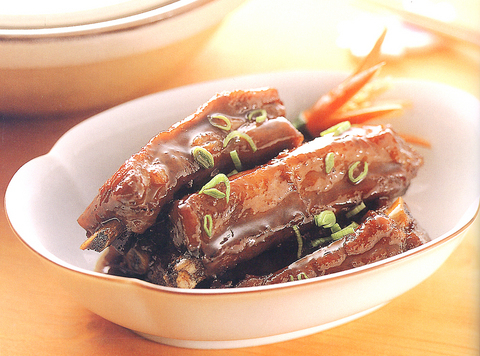John Chen (
Chen was born and raised by a humble family in Hualian. His parents come from Zhejiang Province, in China. Chen learned the art of cooking when he was 14 and worked as an apprentice at the Three-Six-Nine restaurant (三六九飯館), near the back entrance of 228 Memorial Park. Chen emigrated to the US with his parents in 1980. A few years later, he opened the Garden of Plenty restaurant in Long Island and has built up his reputation ever since.
Chen is an easygoing guy and fun to talk with, which are two keys to his business success. He returned to Taiwan in 1994 and, by coincidence, bought the restaurant where he had his apprenticeship, turning it into a very classy three-story eatery. His private kitchen, named Fantasy Palace (

PHOTO COURTESY OF FANTASY GARDEN
It was here that Chen shocked the local culinary community in 2004 by being the first chef to present a banquet of marvelous dishes adapted from a very special recipe. The recipe was recorded in a classical Chinese poem that was pictured in one of grand master Chang Da-chien's (
Last year, Chen was encouraged by eminent culinary critic Chu Chen-fan (
Fantasy Garden changes its menu every two to three months and its new dishes are quickly copied by many restaurants all over Taiwan.
"Shanghai cuisine is like a big ocean which takes in different traditions of the Jiang-Zhe cuisine (

April 28 to May 4 During the Japanese colonial era, a city’s “first” high school typically served Japanese students, while Taiwanese attended the “second” high school. Only in Taichung was this reversed. That’s because when Taichung First High School opened its doors on May 1, 1915 to serve Taiwanese students who were previously barred from secondary education, it was the only high school in town. Former principal Hideo Azukisawa threatened to quit when the government in 1922 attempted to transfer the “first” designation to a new local high school for Japanese students, leading to this unusual situation. Prior to the Taichung First

When the South Vietnamese capital of Saigon fell to the North Vietnamese forces 50 years ago this week, it prompted a mass exodus of some 2 million people — hundreds of thousands fleeing perilously on small boats across open water to escape the communist regime. Many ultimately settled in Southern California’s Orange County in an area now known as “Little Saigon,” not far from Marine Corps Base Camp Pendleton, where the first refugees were airlifted upon reaching the US. The diaspora now also has significant populations in Virginia, Texas and Washington state, as well as in countries including France and Australia.

On April 17, Chinese Nationalist Party (KMT) Chairman Eric Chu (朱立倫) launched a bold campaign to revive and revitalize the KMT base by calling for an impromptu rally at the Taipei prosecutor’s offices to protest recent arrests of KMT recall campaigners over allegations of forgery and fraud involving signatures of dead voters. The protest had no time to apply for permits and was illegal, but that played into the sense of opposition grievance at alleged weaponization of the judiciary by the Democratic Progressive Party (DPP) to “annihilate” the opposition parties. Blamed for faltering recall campaigns and faced with a KMT chair

Article 2 of the Additional Articles of the Constitution of the Republic of China (中華民國憲法增修條文) stipulates that upon a vote of no confidence in the premier, the president can dissolve the legislature within 10 days. If the legislature is dissolved, a new legislative election must be held within 60 days, and the legislators’ terms will then be reckoned from that election. Two weeks ago Taipei Mayor Chiang Wan-an (蔣萬安) of the Chinese Nationalist Party (KMT) proposed that the legislature hold a vote of no confidence in the premier and dare the president to dissolve the legislature. The legislature is currently controlled